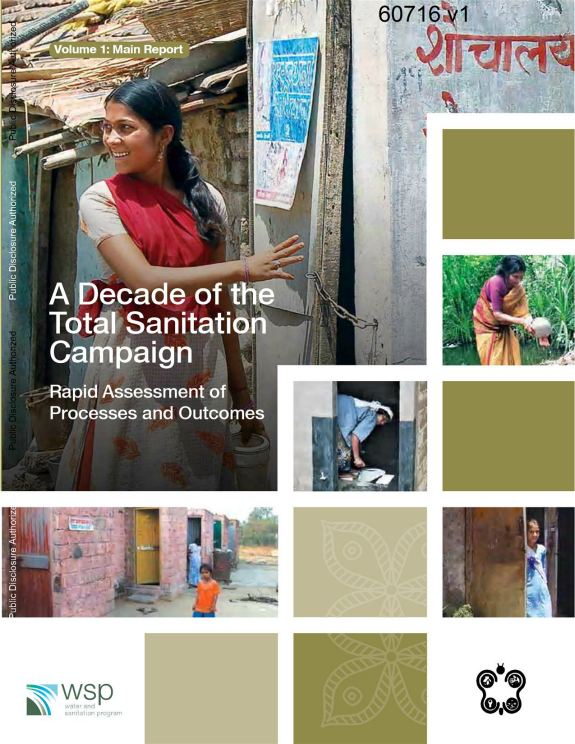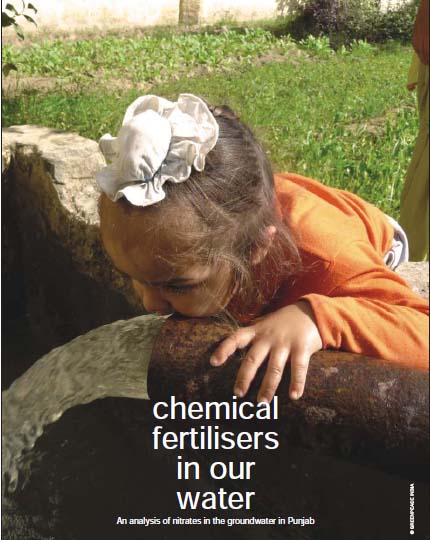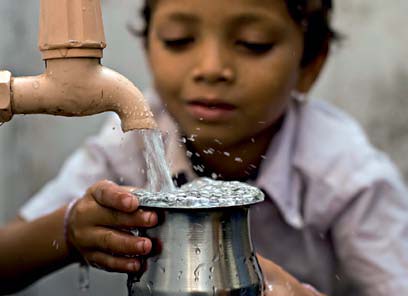Health
Assam’s strategy and action plan on climate change - Recommendations - First draft - ASTEC (2011)
Posted on 07 Nov, 2011 11:20 AMThis report by the Assam Science Technology & Environment Council (ASTEC) contains the compiled recommendation of three consultative workshops organized in Assam University, Gauhati University and
Impacts of climate change on public health in India - Paper published in Environmental Health Perspectives
Posted on 03 Nov, 2011 07:40 PMThis paper published in the journal Environmental Health Perspectives briefly summarises the relevant literature and highlights the challenges and opportunities for innovative research in the context of the impact of changing temperatures and precipitation patterns due to climate change on the health of populations from developing countries such as India.
A decade of the Total Sanitation Campaign - Rapid assessment of processes and outcomes - A report by the World Bank
Posted on 01 Nov, 2011 10:07 PM This report by the Water and Sanitation Program (WSP), The World Bank analyses primary and secondary data from the Total Sanitation Campaign (TSC) of the Government of India, which has been in operation for over a decade (1999 to date).
This report by the Water and Sanitation Program (WSP), The World Bank analyses primary and secondary data from the Total Sanitation Campaign (TSC) of the Government of India, which has been in operation for over a decade (1999 to date).
The audience for this report includes policy-makers and implementers at national, state and district levels, and the broader sanitation and hygiene community. The report aims at gaining an understanding of the processes, outputs and outcomes of the campaign at a national level and across the states as compared with the inputs that have gone into the program.
The report draws on these indicators, which are then compared individually and in combination to benchmark the states, to understand the relative performance of the states. This benchmarking, based on a combination of eight indicators, is undertaken for both states and districts across the country.
Equity and inclusion in sanitation and hygiene in South Asia - A regional synthesis paper - WSSCC, UNICEF and WaterAid
Posted on 31 Oct, 2011 03:31 PMThis working paper by the Water Supply and Sanitation Collaborative Council (WSSCC), UNICEF and WaterAid highlights the fact that a staggering 716 million men, women and children defecate in the open every day, in South Asia, contributing to the most appalling concentration of poverty and disease and the poorest standards of hygiene in the world.
Chemical fertilizers in our water - An analysis of nitrates in the groundwater in Punjab by Greenpeace
Posted on 31 Oct, 2011 09:00 AM The level of nitrate in drinking water was tested from groundwater artesian wells located within farms and surrounded by crops (mostly rice and wheat rotations).
The level of nitrate in drinking water was tested from groundwater artesian wells located within farms and surrounded by crops (mostly rice and wheat rotations).
Nitrate pollution in groundwater is associated with nitrogen loads in the environment. In urban areas, it is associated with sewage and in agriculture areas, with livestock sources and nitrogen fertiliser inputs. Nitrate pollution in drinking water can have serious health impact on humans, especially for babies and children. The most significant potential health effects of drinking water contaminated with nitrate are the blue-baby syndrome (methemoglobinemia) and cancer.
Sanitation in India: Progress, differentials, correlates and challenges – A report by ADB
Posted on 30 Oct, 2011 08:14 AMThis report by Asian Development Bank (ADB) deals with sanitation in India, in particular the progress, differentials, correlates, and challenges. Improved sanitation is essential to reduce ill health, child mortality, lost income associated with morbidity, and to improve environment, human dignity, and quality of life. Goal 7, target 3 of the Millennium Development Goals (MDGs) stipulates decreasing the proportion of population without sustainable access to basic sanitation by 50 per cent in the year 2015.
Where and how is the state - Accessing water and the state in Mumbai and Johannesburg - Journal of Asian and African Studies
Posted on 29 Oct, 2011 05:28 PMThis paper published in the Journal of Asian and African Studies examines the argument that the political and institutional contexts of service delivery shape people's access to the state and its resources and also the mediation between citizens and g
Towards drinking water security in India: Lessons from the field – A report by Water and Sanitation Program
Posted on 29 Oct, 2011 11:33 AM This report by the Water and Sanitation Program of the World Bank provides an account of the field level initiatives on drinking water security in India. The country faces many challenges in ensuring reliable, sustainable safe drinking water supply to rural households.
This report by the Water and Sanitation Program of the World Bank provides an account of the field level initiatives on drinking water security in India. The country faces many challenges in ensuring reliable, sustainable safe drinking water supply to rural households.
Though, in terms of provision of safe drinking water, more than 90 percent of the rural households have been covered, according to the NSSO 65th round survey 2008-09, much remains to be done to improve levels of service delivery, water quality and sustainability.
Performance of sewage treatment plants - Coliform reduction - Control of urban pollution series - CPCB (2008)
Posted on 27 Oct, 2011 12:38 PMThis report presents the findings of a study conducted by CPCB with the help of Indian Institute of Technology, Roorkee and Anna University, Chennai on the performa
An overview of arsenic in groundwater in Tamil Nadu – A report by Water Resources Department
Posted on 26 Oct, 2011 06:03 PMNow-a-days heavy metal arsenic poses a health risk problem throughout the world. Arsenic may be found in water which has flowed through arsenic-rich rocks. Severe health effects have been observed in populations drinking arsenic-rich water over long periods in countries world-wide.





